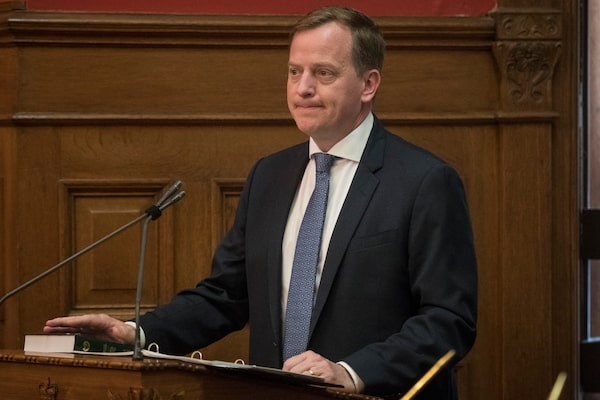
After concluding its turbines would harm local bat populations, Environment Minister Jeff Yurek, seen here on June 20, 2019, revoked the Nation Rise Wind Farm’s permit on Dec. 4.Tijana Martin/The Canadian Press
Builders of a nearly completed wind farm southeast of Ottawa have asked a judge to reverse Ontario’s cancellation of its operating permit amid mounting uncertainty about the future of renewable energy projects in the province.
After concluding its turbines would harm local bat populations, Environment Minister Jeff Yurek revoked the Nation Rise Wind Farm’s permit on Dec. 4. That was just three months before they were to begin generating electricity: 16 of the planned 29 turbines were fully or partially built. The owner, which says it has spent or committed $230-million to date, asked Ontario’s Divisional Court on Dec. 10 for a judicial review on the grounds the decision was incorrect and unreasonable.
“It’s just astonishing to us that this happened at this stage of the project,” said Ryan Brown, executive vice-president for EDP Renewables Canada, a subsidiary of Madrid-based EDP Renovaveis S.A.
“Our intention with this action is to quash the decision, get back to work and build this wind farm.”
Citing the application, Andrew Buttigieg, a spokesman for Mr. Yurek, declined to comment.
The previous Liberal government approved the project in 2018, just days before the launch of the last election campaign, a vote that brought to power the Progressive Conservatives under Doug Ford, an opponent of wind and solar projects. After an appeal from residents near the Nation Rise site, the Environmental Review Tribunal ruled in the project’s favour in January. Construction began in May.
However, the residents’ group, Concerned Citizens of North Stormont, appealed to the minister, saying the tribunal hadn’t adequately considered the project’s impact.
Mr. Yurek upheld nearly all of the tribunal’s ruling. However, he concluded that small local colonies of Big Brown bats, Hoary bats and Little Brown bats (the latter a species at risk) might collide with turbine blades. Saying Nation Rise would “cause serious and irreversible harm to bats,” he withdrew the approval.
EDP said its provisions regarding bats “went far beyond industry standards and provincial requirements.” Among other things, Nation Rise’s permit required monitoring of bird and bat deaths, and additional measures if the kill rate exceeded 10 bats per turbine annually. But Mr. Yurek called that inadequate.
Tom LoTurco, EDP’s director of development in Canada, said the government has made clear its hostility toward renewable energy generation. “We don’t believe that this decision was about bats,” he said.
Nor did the Opposition. At a press conference at Queen’s Park on Friday, the NDP accused the government of using the health of bat populations as a “flimsy excuse.”
Ian Arthur, the NDP’s environment critic, noted environmentalists have criticized the government’s recent changes to its Endangered Species Act for allowing developers to pay a fee in lieu of implementing mitigation measures to help an endangered species.
“Considering that this is the government that gutted the Endangered Species Act very recently, I am incredibly skeptical that bats are truly the priority for this minister,” Mr. Arthur said.
Erin Baerwald, a conservation biologist specializing in migratory bats and an assistant professor at the University of Northern British Columbia, said the government’s rationale in overriding the tribunal was “grasping at straws.”
While acknowledging wind turbines can pose risks to bats, Dr. Baerwald said the company had gone beyond all current requirements for bat protection.
For example, she said EDP planned to shut off its turbines in low wind during the bats’ migration periods, which she said would reduce bat fatalities by half. It had also volunteered to bring in measures even though bat populations in the area are low, she said.
“We can have bats and green energy co-exist,” Dr. Baerwald said, arguing climate change, not wind power, is the greatest threat.
Tim Gray, executive director of Toronto-based Environmental Defence, said the government has displayed an “irrational hatred” for wind and solar projects.
“They just got done completely gutting the Endangered Species Act," he said. "Clearly, this is not a government that would prioritize the survival of endangered species over industrial activity.”
Robert Hornung, president of the Canadian Wind Energy Association, said the minister’s decision will weaken investor confidence, resulting in higher financing costs for future projects and higher electricity costs.
“People see Ontario currently as a significantly less attractive place for future investment than other parts of the country,” he said.
The NDP said the cancellation could cost Ontario at least $200-million, on top of the $231-million the government expects to pay for the demolition of another large wind farm in Eastern Ontario, White Pines, and the cancellation of more than 700 smaller solar and wind projects.
Thomas Timmins, head of the energy sector group at the Toronto-based Gowling WLG law firm, said the fate of Nation Rise and White Pines has worried pension funds, life insurance companies and other major investors in energy projects, bridges, hospitals and other infrastructure. “Anything that appears arbitrary coming from government makes them nervous,” he said.
However, he said, Ontario remains highly regarded as a place to invest, in part because its courts are willing to rule against governments when their behavior is arbitrary or vexatious. “This isn’t the first time this has happened in the history of Ontario,” he added, citing the Liberals’ termination of an offshore wind project in 2011.
Our Morning Update and Evening Update newsletters are written by Globe editors, giving you a concise summary of the day’s most important headlines. Sign up today.